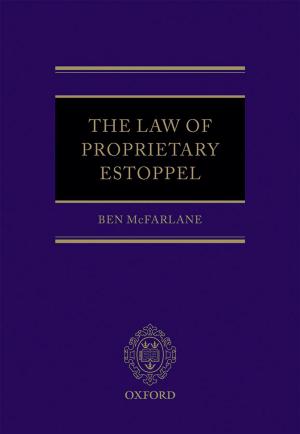Coercion and Responsibility in Islam
A Study in Ethics and Law
Nonfiction, Reference & Language, Law, Legal History, Religion & Spirituality| Author: | Mairaj U. Syed | ISBN: | 9780191093098 |
| Publisher: | OUP Oxford | Publication: | November 17, 2016 |
| Imprint: | OUP Oxford | Language: | English |
| Author: | Mairaj U. Syed |
| ISBN: | 9780191093098 |
| Publisher: | OUP Oxford |
| Publication: | November 17, 2016 |
| Imprint: | OUP Oxford |
| Language: | English |
In Coercion and Responsibility in Islam, Mairaj Syed explores how classical Muslim theologians and jurists from four intellectual traditions argue about the thorny issues that coercion raises about responsibility for one's action. This is done by assessing four ethical problems: whether the absence of coercion or compulsion is a condition for moral agency; how the law ought to define what is coercive; coercion's effect on the legal validity of speech acts; and its effects on moral and legal responsibility in the cases of rape and murder. Through a comparative and historical examination of these ethical problems, the book demonstrates the usefulness of a new model for analyzing ethical thought produced by intellectuals working within traditions in a competitive pluralistic environment. The book compares classical Muslim thought on coercion with that of modern Western thinkers on these issues and finds significant parallels between them. The finding suggests that a fruitful starting point for comparative ethical inquiry, especially inquiry aimed at the discovery of common ground for ethical action, may be found in an examination of how ethicists from different traditions considered concrete problems.
In Coercion and Responsibility in Islam, Mairaj Syed explores how classical Muslim theologians and jurists from four intellectual traditions argue about the thorny issues that coercion raises about responsibility for one's action. This is done by assessing four ethical problems: whether the absence of coercion or compulsion is a condition for moral agency; how the law ought to define what is coercive; coercion's effect on the legal validity of speech acts; and its effects on moral and legal responsibility in the cases of rape and murder. Through a comparative and historical examination of these ethical problems, the book demonstrates the usefulness of a new model for analyzing ethical thought produced by intellectuals working within traditions in a competitive pluralistic environment. The book compares classical Muslim thought on coercion with that of modern Western thinkers on these issues and finds significant parallels between them. The finding suggests that a fruitful starting point for comparative ethical inquiry, especially inquiry aimed at the discovery of common ground for ethical action, may be found in an examination of how ethicists from different traditions considered concrete problems.















